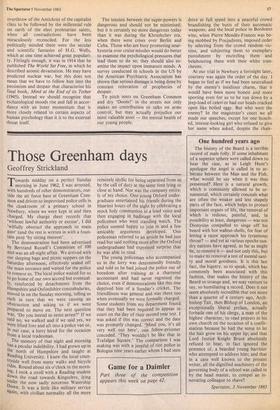Last things first
Robert Cecil
Forty-five years ago, on 30 October 1938, Orson Welles perpetrated his famous radio hoax. Several million American listeners heard the CBS broadcast, announ- cing that the Martians had landed in New Jersey — the prelude to the holocaust foreshadowed 40 years earlier by H.G. Wells in The War of the Worlds. Panic en- sued and a subsequent Gallup poll conclud- ed that about 25 per cent of the listeners gave credence to the announcement. Inter- views conducted by psychologists indicated that a high proportion of the hoax victims suffered from a sense of insecurity and in- adequacy, connected in some cases with belonging to an ethnic or religious minority; others had been infected by feelings of guilt that made them more disposed to accept as imminent not only their own dissolution but also that of a large section of humanity. It is appropriate to recall this episode at a time when many people, including some holding positions of responsibility, have taken up an irrational and fatalistic attitude towards the threat of nuclear war. To make this statement is not to dismiss the threat, nor to abandon the hope of arms control by international agreement; but the insistence of the CND that there would be virtually no survivors is an emotional judgment, which ignores the expert opinion of those who have actually studied the subject in depth. It also runs contrary to the judgment of ex- perts in the USSR, where a comprehensive system of civil defence is in operation. It is, of course, much easier to assume complete catastrophe than it is to study the pro- babilities in detail in a book such as Ivan Tyrrell's The Survival Option (Cape, 1982). But it is highly irresponsible of local authorities to declare themselves 'nuclear- free' zones as if this would induce radioac- tive clouds to pass them by. There are measures that can be taken to reduce the dangers for a substantial section of the population and it is the duty of all sane peo- ple to examine them in an objective spirit. Failure to do so exacerbates the paranoia and can have a depressing and destabilising effect on those who are too young to place in an historical context these cyclic manifestations of belief that, the end of the world is at hand.
A timely reminder of this historical perspective was given last February at the General Synod of the Church of England by Dr Blanch, then Archbishop of York, who pointed out that early Christians not only held that the world would soon end, but that such a consummation was devoutly to be wished. Although in the post- Constantine era this belief became submerged, as the Church established a new orthodoxy, it persisted in varying forms throughout the Middle Ages. Its periodic re-emergence has been ably chronicled by Norman Cohn (The Pursuit of the Millen- nium, Paladin, 1970), who has also drawn attention to the Messianic and millenarian elements in the modern ideologies of Marx- ism and Nazism. The Reformation gave new impetus to apocalyptic thought, as Luther, Melancthon and other reformers attempted to identify the Papacy with An- tichrist, whose final defeat was to be a por- tent of 'the last things'. Such thinking was nourished by assiduous reading of the books of Daniel and Revelation, and in the 17th century Cromwell was troubled by the insistence of the Fifth Monarchy Men that Christ was about to return with His saints to rule for 1,000 years.
Beliefs of this kind survived the so-called Age of Reason; indeed they were stimulated by the great revolutions — the French Revolution and the industrial revolution, which brought about such a drastic upheaval in the economic and social system. Early in the last century followers of Joanna Southcott proclaimed in the streets of London the coming of 'The Shiloh'. Although Shiloh signifies 'Prince of Peace', his advocates prophesied mass mortality among the inhabitants of the wicked metropolis. These obsessions were not confined to the poor and outcast; the Revd Edward Irving preached the Second Coming before fashionable congregations at the Regent Square church in North Lon- don, and the millenarian 'Catholic Apostolic Church' had such prominent 'Apostles' as the banker Henry Drummond MP and Spencer Perceval MP, son of the murdered prime minister.
Modern minds might assume that the secularisation of thought in the second half of the 19th century would have eliminated apocalyptic elements; but this has not prov- ed to be the case. All that has happened is that the theological trimmings have been discarded. In Marxism the Messiah has been collectivised; but we can still trace such apocalyptic features as the violent
overthrow of the Antichrist of the capitalist class to be followed by the millennial rule on earth of the elect, proletarian saints, when all contradictions have been miraculously reconciled, For the less politically minded there were the secular and scientific fantasies of H.G. Wells, which at one time achieved great populari- ty. Fittingly enough, it was in 1914 that he published The World Set Free, in which he described atomic devastation. He may have predicted nuclear war, but this does not mean that we have to follow him into the pessimism and despair that characterise his final book, Mind at the End of its Tether (1945). Instead we should recognise that eschatological moods rise and fall in accor- dance with an inner momentum that is more closely related to certain aspects of human psychology than it is to the external threat itself.
The tension between the super-powers is dangerous and should not be minimised; but it is certainly no more dangerous today than it was during the Khrushchev era, when there were crises over Berlin and Cuba. Those who are busy promoting near- hysteria over cruise missiles would do better to examine the psychological pressures that lead them to do so; they should also ex- amine the impact upon immature minds. A survey conducted in schools in the US by the American Psychiatric Association has shown that serious damage is being done by constant reiteration of prophecies of despair.
To pitch tents on Greenham Common and dry 'Doom!' in the streets not only makes no contribution to talks on arms control, but may actually prejudice our most valuable asset — the mental health of our young people.















































 Previous page
Previous page